Butet Manurung Provides a Liberating Education for Orang Rimba, the Indigenous People of Jambi
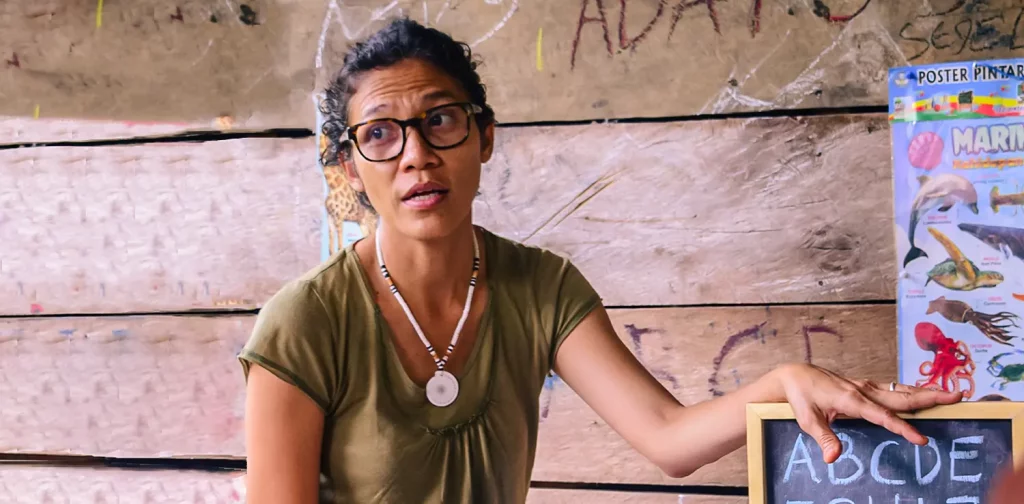
Butet Manurung | Photo: Butet Manurung’s Archive
At the beginning of decentralization in Indonesia, logging was rampant in Bukit Duabelas National Park (BDNP), a protected area on the island of Sumatra. This area included Makekal, home to the Indigenous community Orang Rimba. Day by day, trees were cut down, forcing Orang Rimba to flee deeper into the forest for a safer place to live.
The situation troubled Saur Marlina Manurung. At the time, she was working at an NGO focusing on assisting Indigenous communities living in the forests of Jambi. She thought the issue should be handled more comprehensively from the roots, beyond preventing and ceasing illegal logging or aiding Orang Rimba after the fact.
The woman familiarly called Butet Manurung saw that behind the deforestation, a uniquely complicated problem kept making Orang Rimba the victims of injustice, scams, rights violations, and cultural genocide.
“In the early 2000s, I saw, for instance, many programs and aids from the government without any cultural perspectives. There was a ‘welfare package’, essentially inviting Orang Rimba to get out of the forest, live a modern life, build houses on soil, embrace religions, wear clothes, farm, and settle. For some, it might not be a problem, but it was a big one for me. Because it wasn’t what Orang Rimba wanted. Surprisingly, this model is still used nowadays,” said Butet.
Another pressing issue that caught Butet’s eye was the education of Indigenous people. She saw that the schools the government provided often didn’t accommodate or respect their cultures.
She said, “The schools provided were exactly the same as other public schools we know. Their cultures and lifestyles were ignored. For example, Orang Rimba were used to being in wooden houses on stilts but were forced to go to school in concrete buildings on the soil. They were told to wear uniforms and be in school from morning to late afternoon. Told to learn about things that had nothing to do with their lives while not being taught how to survive in the forest.”
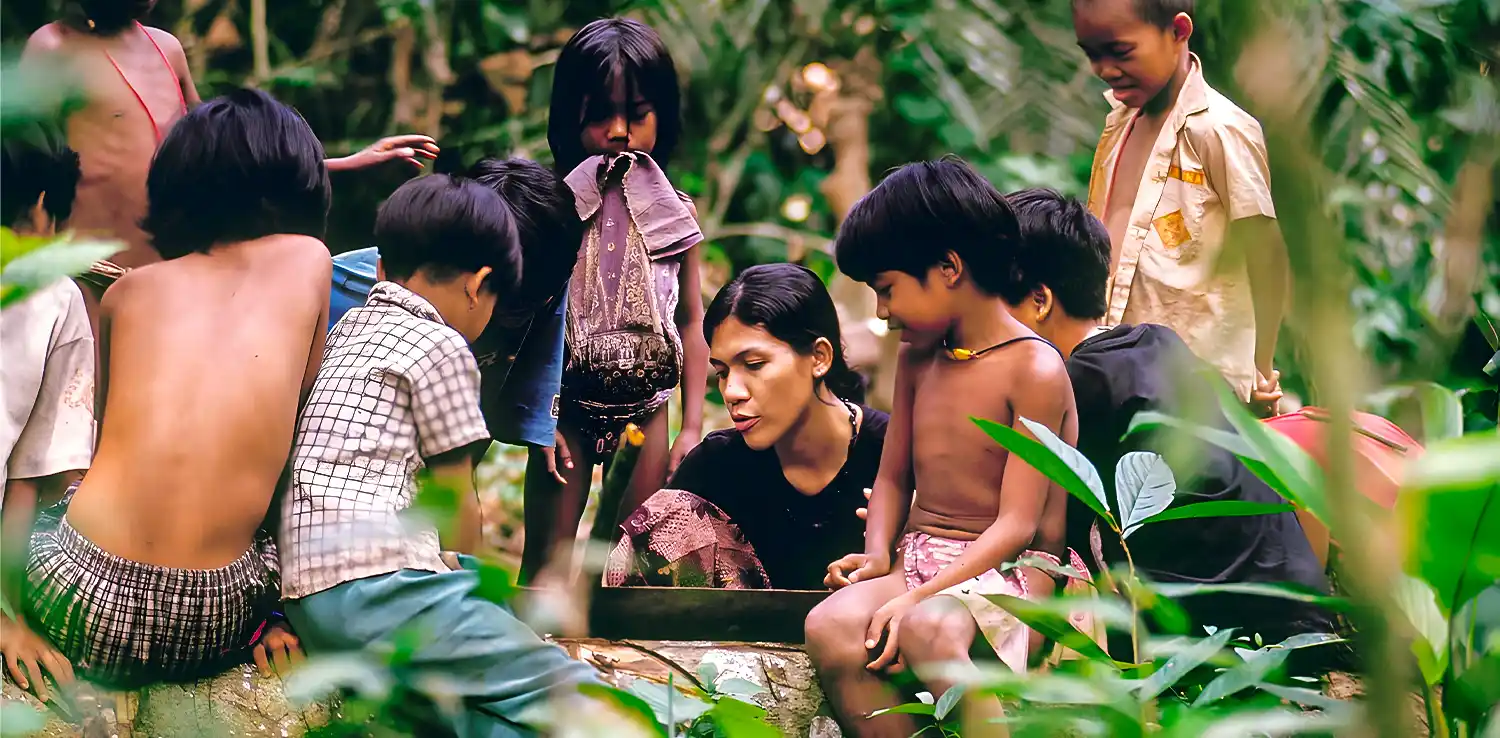
The dissonance of concept and method for the education of Indigenous peoples wasn’t a trivial matter, in Butet’s opinion. She believed that if we let it go on, Indigenous peoples and their ways of life, including their knowledge and wisdom, would be further pushed to the brink of extinction. This scenario would be most unfortunate for the world as their existence is essential for the continued health of biodiversity and ecosystems.
“We often hear how education is to help you reach your dreams. Well, their dreams are to stay in the forest and protect it. ‘Outsiders’ find that hard to understand about Orang Rimba. The meaning of ‘success’, ‘happiness’, and ‘intelligence’ that outsiders bring differs from what Orang Rimba have, yet they keep forcing it. Even that’s already a problem,” said Butet.
Since then, Butet has been adamant that to save the forests, we need to empower the Indigenous communities living in them.
“It’s impossible to save the forest if its inhabitants don’t do it themselves. They have to be stronger. So, I finally shifted my focus from the forest to the people to make forest conservation more sustainable,” said the woman born on February 21, 1972.
Establishing Sokola Rimba
Butet spent months studying the life of Orang Rimba and roaming tens of thousands of hectares of forest to better understand their predicaments. From the experience, she was convinced that the path to go was an education that liberated them.
She recalled, “From them, I learned that their troubles were complicated. Orang Rimba must be able to help themselves, not have us help them.”
Then, in 2003, Butet established Sokola Rimba with several friends. The word ‘Sokola’ comes from the Rimba language, meaning ‘a place to learn’. There is no fixed curriculum. Besides the basic literacy of reading-writing-counting, all lessons are adapted to the conditions and life problems of Orang Rimba.
“They shaped our school system. My friends and I realized that education must liberate. It has to be aligned with customs and cultures, participative, filled with dialogues, and beneficial for the daily life,” she said.
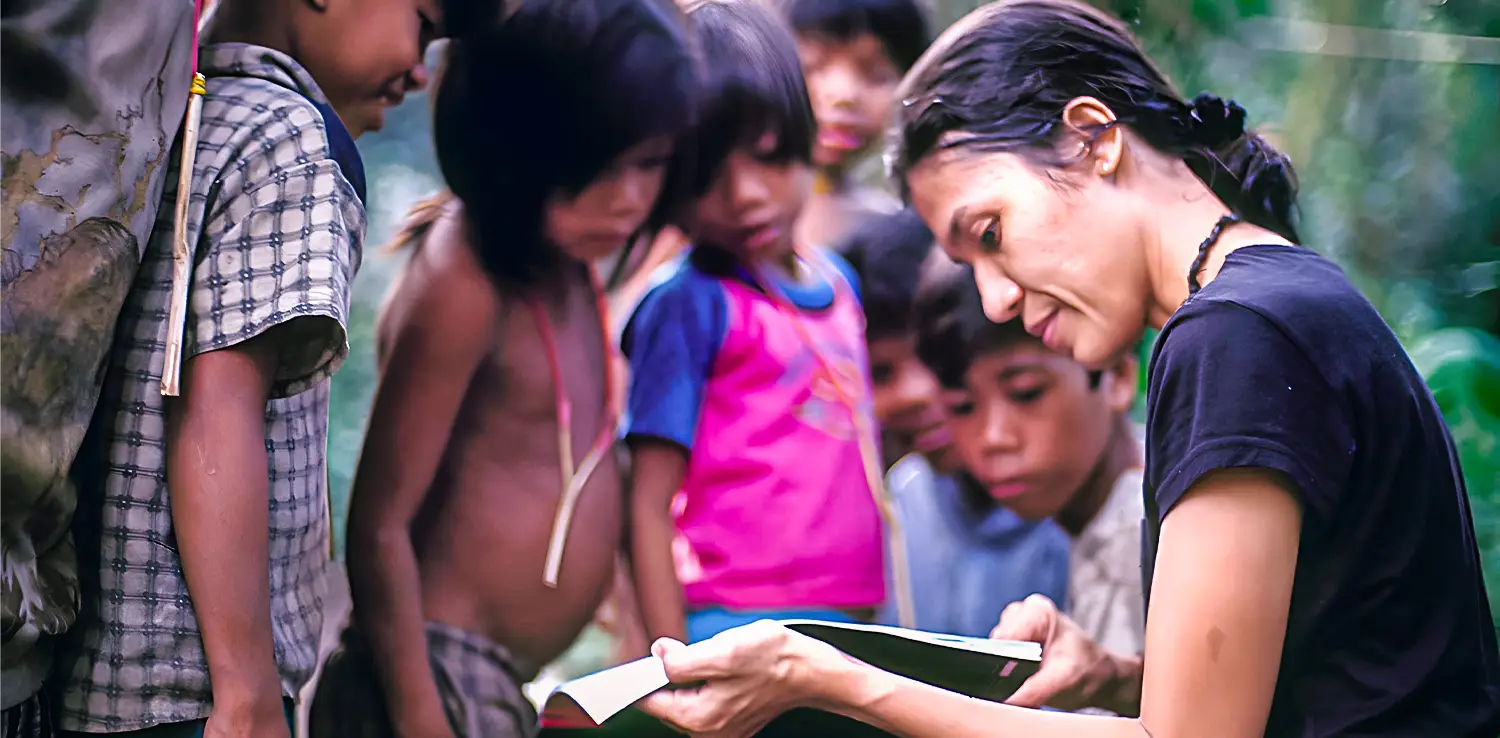
Butet gave us an example. To protect their forest, Orang Rimba must learn skills to support their advocacy efforts, such as mapping, understanding the laws and rights of Indigenous peoples, and even scriptwriting and documentary making.
“They’re critical, always asking the purpose of each lesson. If I can’t answer, they don’t want to learn. The point is that we can only teach them what they don’t already know—helping them tackle their problems and understand the outside developments. So, Sokola exists not to modernize them or educate them as if they’re stupid. No. We offer the knowledge to help them defend and attain their rights,” said Butet.
Butet’s path to provide education for Orang Rimba wasn’t smooth. She faced a lot of rejections and expulsions in the beginning. Still, she kept trying to get close to them and live among them. She even learned their Indigenous language, Rimba, learned how to hunt, ate what they ate, and dressed how they dressed. In short, she applied an anthropological approach to convince them. Later, when Sokola Rimba developed, this approach was also used by other volunteers in all communities.
At last, it took seven months for Orang Rimba to accept Butet, but not until after she swore not to commit evil in their forest.
Butet reminisced and laughed at the memory, “At the time, I was asked to swear: not to sell their children, not to sacrifice them, not to make them Muslims or Christians, not to sell their forest, not to change them to be city dwellers. Those vows were like threats should I violate them. If I were on land, a tiger would eat me; if I went to the forest, a tree would fall on me; and if I went to the river, a crocodile would eat me.”
“When I was first accepted with those conditions, suddenly, the Chief passed away. The pencils I brought were thought to bring death. Then I thought, ‘If pencils aren’t allowed, I’ll use twigs with coal to write.’”
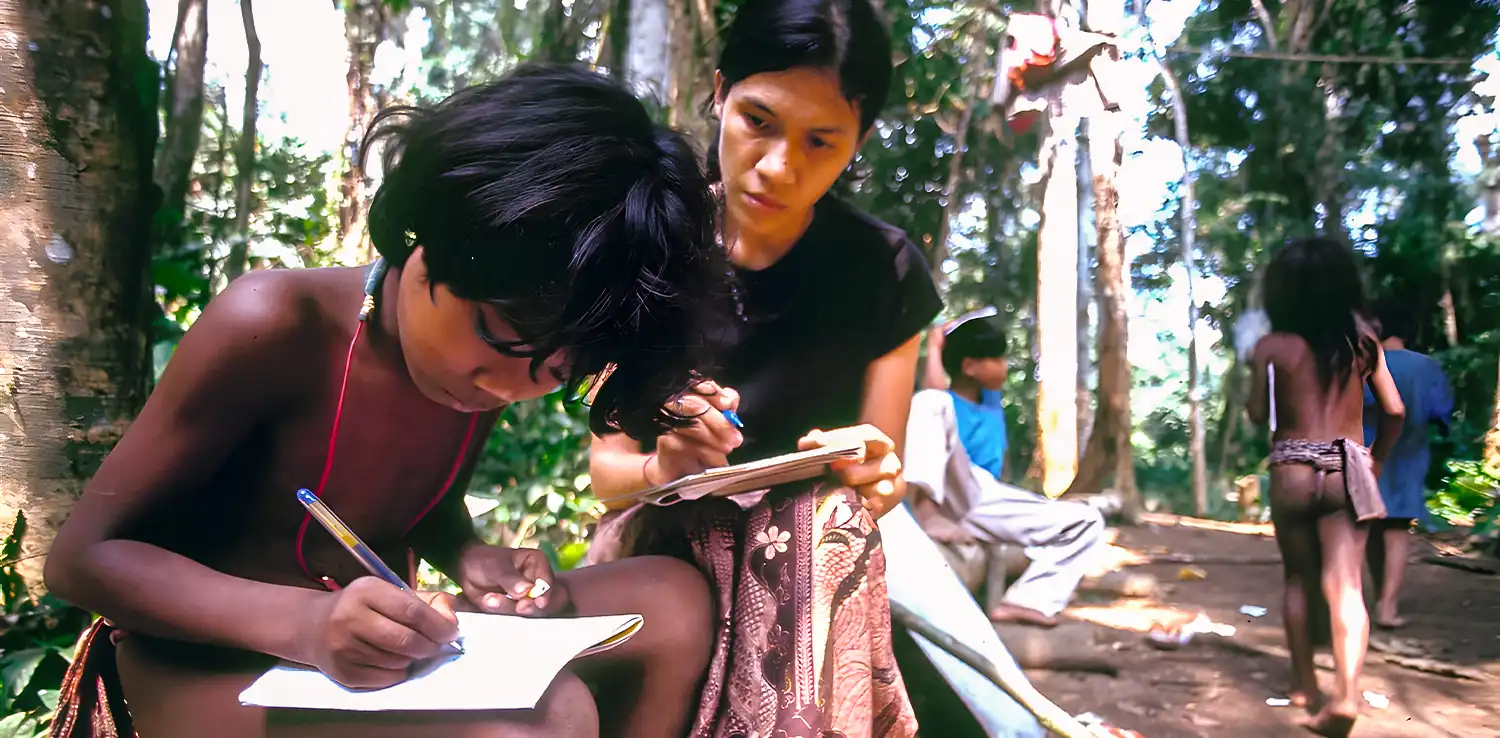
From Orang Rimba to the Rest of Indonesia
Butet’s struggles bore fruit. After years of Sokola Rimba, Orang Rimba slowly became capable of protecting and attaining their rights, including pushing the government to adopt their customs into the Bukit Duabelas National Park Zonation regulations.
“The students of Sokola formed an organization called KMB—Kelompok Makekal Bersatu (=United Makekal Group). They were the ones advocating for the zonation laws. They demanded to have their customs adopted into the National Park policies,” said Butet.
She recounted the process, “It was a long battle that lasted about 12 years. They learned mapping and made a documentary film on their culture. They had to learn GPS to pinpoint forest areas. They went back and forth, mapping on paper and inputting it into the computer. Before those things, they had to learn how to write letters to convey their criticisms and make film scripts. Finally, they were legally recognized, and their customs got adopted into the BD National Park policies. If I may say, it wouldn’t have been possible without Sokola.”
Sokola Rimba changed its name to Sokola Institute and developed to also become a research center on Indigenous communities in 2016. Then, after over a decade in the forests of Jambi, Sokola Institute began to spread to other Indigenous communities across Indonesia that still struggled due to illiteracy.
As of 2023, Sokola Institute has established education programs in 17 Indigenous communities with varying geographical and cultural characteristics. These include the Sikka in Flores, the Sodan in Sumba, the Asmat in Papua, the Kajang in Bulukumba, the Masyarakat Pesisir in Makassar, and the Togutil in Halmahera.
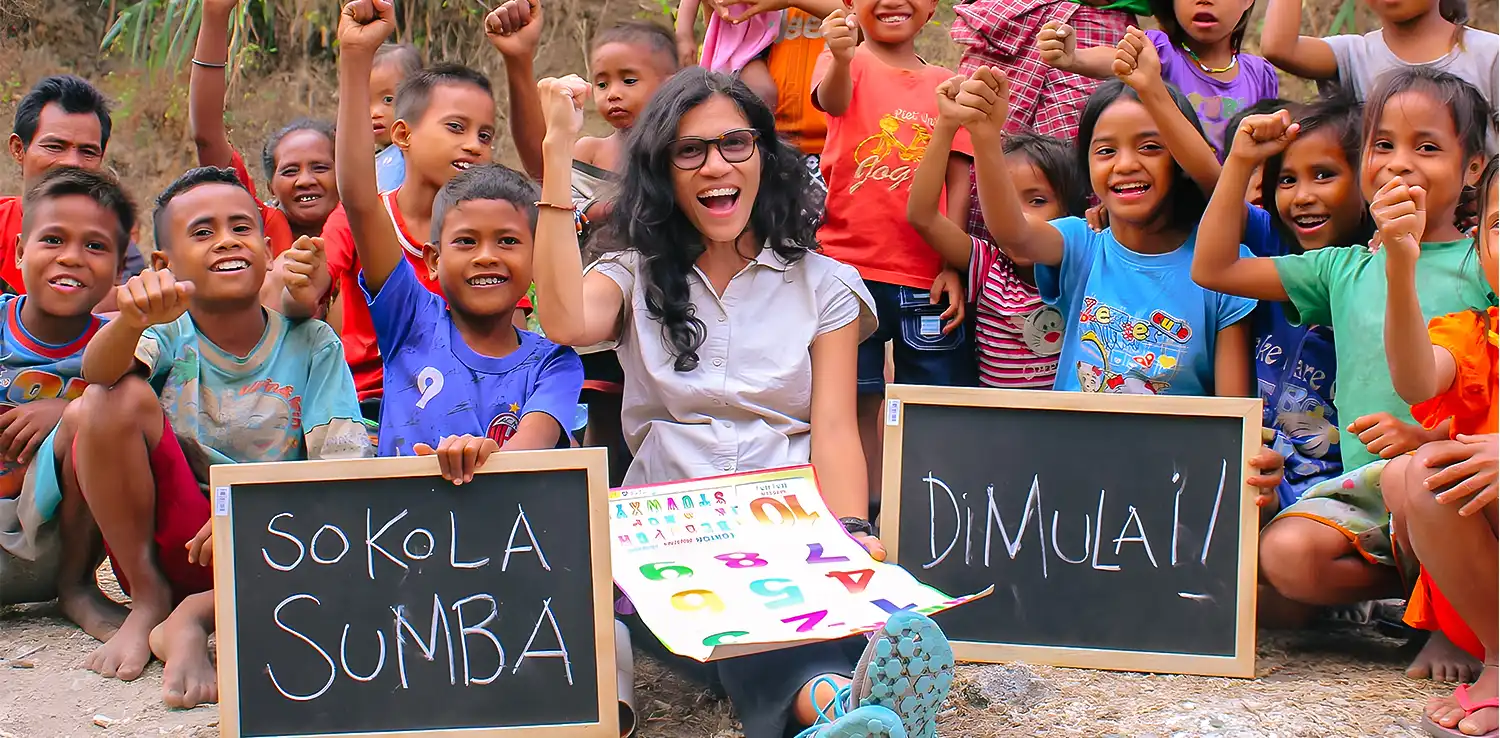
Until now, Sokola Institute has provided alternative education for over 15,000 Indigenous peoples in Indonesia. Those who were illiterate and disadvantaged because of it have become empowered and able to protect their own rights.
“If asked what made me persist until now, well, maybe this is what passion is—the willingness to struggle for what we believe in. But this isn’t about sacrifice. I have never felt that I’ve sacrificed anything to be here. It’s not even serving. It’s me serving my own dreams. It’s me that’s thankful for Orang Rimba who have helped me live my dreams,” said Butet.
Butet hopes for stronger legal protection for the Indigenous peoples of Indonesia. She believes that the Indigenous People Bill that has been discussed since 2010 will contribute to realizing that hope. Moreover, she also hopes every policy regarding Indigenous peoples will be based on field research robust with the cultural study approach.
A Liberating Education
In the eyes of Butet, who has been researching and studying the ways of life of Indigenous communities for over two decades, Indonesia needs to transform the education of Indigenous peoples. She wants all Indigenous communities in Indonesia to be able to organize their own education systems.
“Many schools for Indigenous peoples in Indonesia don’t let the students use their Indigenous languages. They must use Bahasa Indonesia. If they’re found using their native languages, they will be punished. Unwittingly, this harms the children. When they come to their communities, they may deem their Indigenous languages shameful and low. Ultimately, all knowledge within their Indigenous cultures will disappear due to unuse,” said the Anthropology and Indonesian Literature graduate from Universitas Padjajaran.
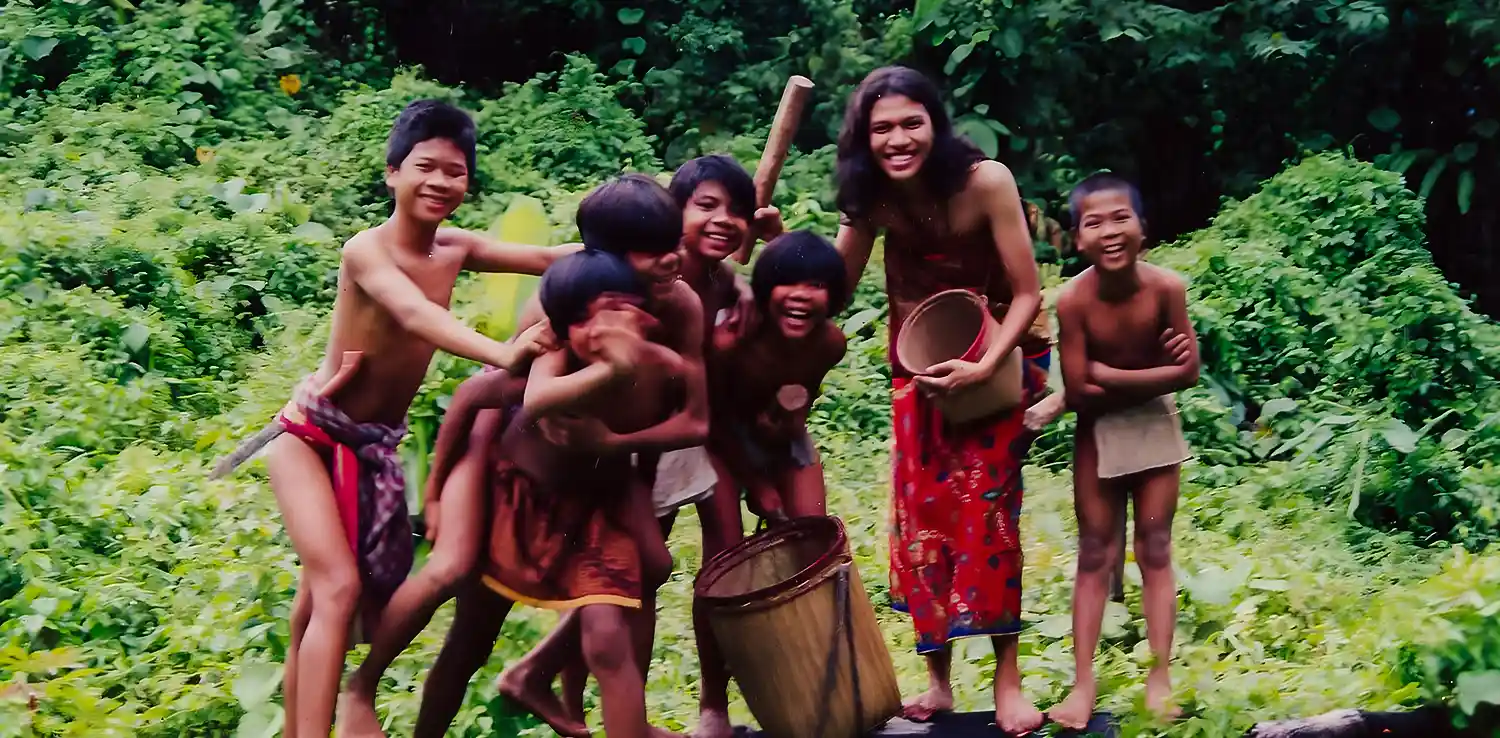
To express her restlessness over the situation, Butet quoted a poem titled Seonggok Jagung (=A Pile of Corn) by WS Rendra.
Seonggok jagung di kamar
tak akan menolong seorang pemuda
yang pandangan hidupnya berasal dari buku,
dan tidak dari kehidupan.
Yang tidak terlatih dalam metode,
dan hanya penuh hafalan kesimpulan.
Yang hanya terlatih sebagai pemakai,
tetapi kurang latihan bebas berkarya.
Pendidikan telah memisahkannya dari kehidupan
(A pile of corn in the bedroom
will not help a young man
whose life visions come from books,
and not from life.
Who is untrained in methods,
and only full of conclusion recitals.
Who is trained to use,
but not to freely create.
Education has separated him from life.)
“I get sad when I read Rendra’s poem. If the formal education model is applied to Indigenous peoples, Indonesia will experience loss: Indigenous knowledge will be gone, and our forests will be gone. There will be ecocide and linguicide. The eradication of language is related to the eradication of natural resources. When an ecocide happens, everyone loses,” she concluded.
Translator: Nazalea Kusuma
The original version of this article is published in Indonesian at Green Network Asia – Indonesia.

Co-create positive impact for people and the planet.
Amidst today’s increasingly complex global challenges, equipping yourself, team, and communities with interdisciplinary and cross-sectoral insights on sustainability-related issues and sustainable development is no longer optional — it is a strategic necessity to stay ahead and stay relevant.


 Exploring the Bidirectional Relationship Between Olympic Games and the Environment
Exploring the Bidirectional Relationship Between Olympic Games and the Environment  The Hidden Threat of Tire Pollution to Salmon Populations
The Hidden Threat of Tire Pollution to Salmon Populations 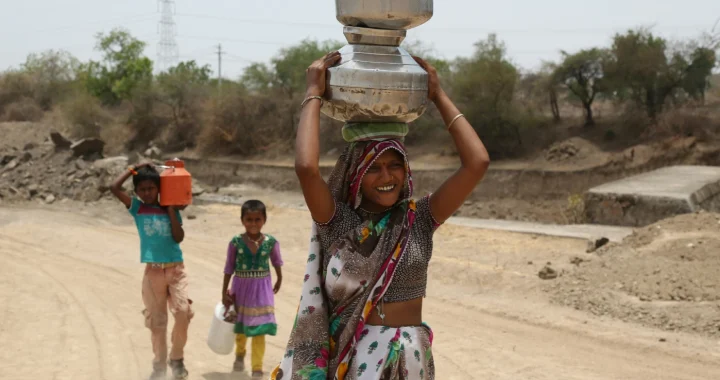 Understanding the Climate-Care Nexus
Understanding the Climate-Care Nexus  Role of Banks in Supporting Decent Work for All
Role of Banks in Supporting Decent Work for All 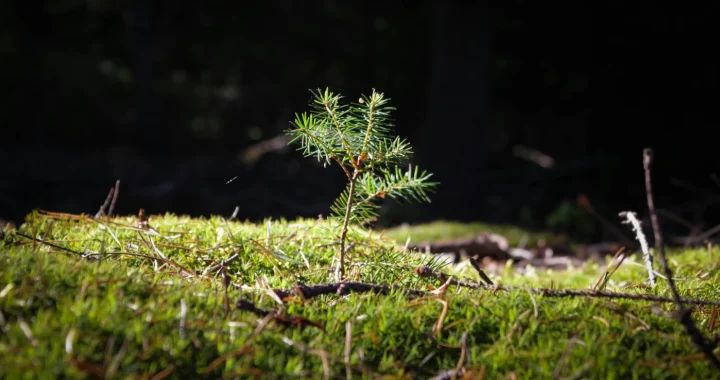 Natural Regeneration for a More Cost-Effective Forest Restoration
Natural Regeneration for a More Cost-Effective Forest Restoration 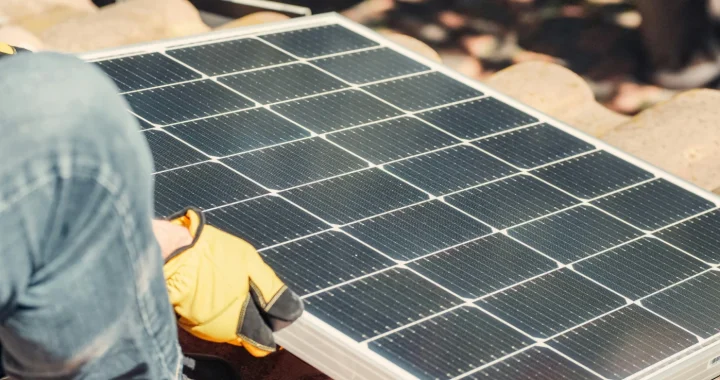 UK’s Local Power Plan to Support Community Energy Development
UK’s Local Power Plan to Support Community Energy Development